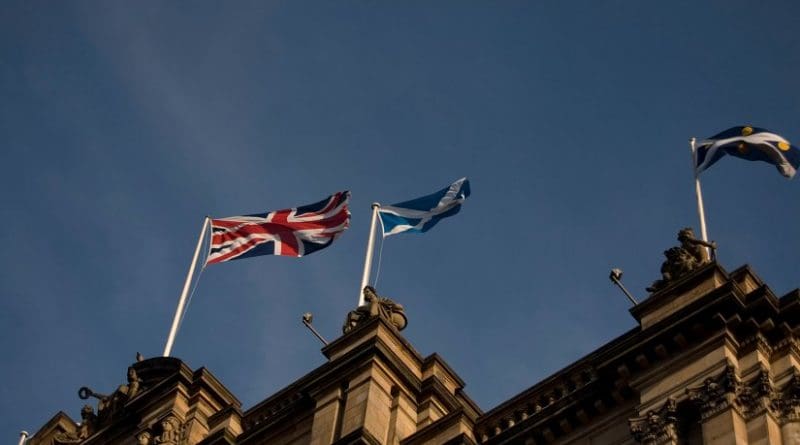Why Scotland And Ireland Are A Challenge For Johnson – OpEd
By Arab News
By Andrew Hammond*
As the UK government delivered its financial budget on Wednesday and launched final preparations for next month’s COP26 climate summit, there are growing signs that change may be in the air in British politics.
This is not just because several recent polls indicate that Boris Johnson’s prime ministership may be losing momentum in England. In addition, far-reaching change may be taking place in the devolved nations, especially the two where the impact of Brexit has been most keenly felt: Scotland, where COP26 will be held, and Northern Ireland.
In Scotland, a new power-sharing deal in the Holyrood legislature between the Scottish National Party and Greens came into effect this month. First Minister Nicola Sturgeon hopes this will provide the pathway toward the nation’s independence. The next few years are likely to see increasing tension between London and Edinburgh over the terms of any new independence referendum — voters previously rejected the idea in 2014 — with about 50 percent of Scottish voters now wanting to leave the union.
In Northern Ireland, a recent LucidTalk opinion survey pointed to remarkable changes in the post-Brexit landscape there too. The Democratic Unionist Party — which reached its own power-sharing deal with the UK Conservatives in Westminster in 2017 under then-Prime Minister Theresa May — was placed fourth in the poll at 13 percent, a big fall-off from the first place it has secured in every Northern Irish election since 2003, whether to the Stormont or Westminster legislatures.
The nationalist Sinn Fein placed first in the survey, at 25 percent, and if these figures are repeated at the next Stormont election in May 2022, the party would secure the post of Northern Irish first minister for the first time. This could be especially significant as Sinn Fein, which favors a united Ireland, is also leading many opinion surveys south of the border in the Republic of Ireland.
What these early straws in the wind may indicate is that the exceptional volatility of UK politics over the last decade-and-a-half — after a series of shocks, from the 2016 Brexit referendum to the aftermath of the 2008-09 financial crisis — is not yet over. This will worry Johnson and the Conservative government in London, as a potentially tricky autumn lies ahead.
This is not least as the popularity of the prime minister and his administration has suffered a sharp decline in some recent polls. One Ipsos Mori survey suggested Conservative voters in particular are becoming more pessimistic about the direction of the country, given concerns over higher inflation and spiraling public debt.
Just 27 percent of those questioned said they had a favorable opinion of Johnson, his lowest rating since October 2020, when the UK was entering its second COVID-19 lockdown. Moreover, optimism about the country’s prospects was lower than at any point since January, as the so-called vaccine “bounce” continued to ebb away from its May peak.
Johnson now hopes to find new political momentum and perhaps help give a governing purpose to his administration in the absence of any coherent, defining signature issues other than leading the UK during the storm of the pandemic. However, a growing number of Conservatives are concerned by at least three issues.
Firstly, there are early signs that the Liberal Democrats are making headway in a number of traditional Conservative seats in the south of England. This was illustrated in the summer with the Chesham and Amersham by-election, which the Liberal Democrats won in a stunning victory, taking a seat previously only ever held by the Conservatives.
Second is the growing prospect of a new Scottish independence referendum and the possibility of Ireland also moving closer to such a plebiscite.
Finally, some are concerned that Labour, which is the largest single party in Wales and is running in second place in polls in England, will also take advantage of the more adverse political weather for the government.
- Andrew Hammond is an Associate at LSE IDEAS at the London School of Economics.

